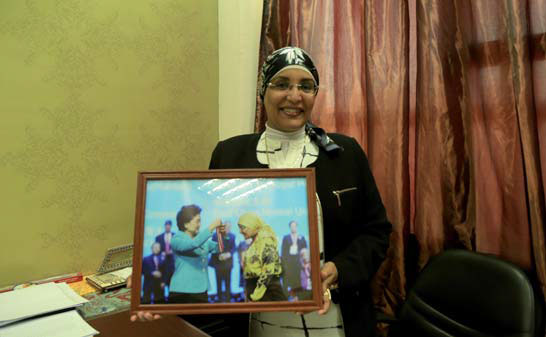Mandarin teachers in high demand
Learning Chinese has grown in popularity in Egypt as bilateral ties grow, leading to shortages
Egyptians' enthusiasm for learning Chinese is increasing, as bilateral trade has grown and new opportunities for exchanges are on the horizon.
As more students choose to learn Chinese and more universities start Chinese departments, there is a shortage of Chinese teachers in Egypt.
|
Rehab Mahmoud, director of the Department of Chinese Language and Literature in Cairo University and dean of Confucius Institute. Hou Liqiang / China Daily |
Omayma Ghanem, a professor of Chinese at Ain Shams University and a pioneer of its Chinese department in the 1950s, says there were only 11 students with a Chinese major in her class when she graduated from Ain Shams in 1983. Now, there are more than 2,000 students with Chinese majors at the university.
When Cairo University started its Chinese department in 2004, there were 20 students, but now that number has grown to 60 in just one grade. The number of students at the Confucius Institute at Cairo University, which was launched in 2007, has also increased from the original 30 to 1,200 a year, according to Rehab Mahmoud, director of the Department of Chinese Language and Literature at Cairo University and also dean of the Confucius Institute. There are now two Confucius institutes in Egypt, with the other at Suez Canal University.
Meanwhile, more universities are opening Chinese departments in the country. According to Ghanem, there are now also Chinese departments at Al-Azhar, Suez Canal, Fayoum, Pharos and Helwan universities, and the Misr University for Science and Technology, which is private. With help from the Confucius institutes, there are also Chinese classes in some junior and senior high schools.
Ghanem says Port Said, Suez and Bani Suef universities are also considering opening Chinese departments.
"There are far from enough Chinese teachers. Although the Chinese government has sent volunteers to assist Chinese teaching in some universities, a lot more are still needed as many Egyptian Chinese teachers are quite recent graduates and are lacking in experience," Ghanem says.
Because of the scarcity of Chinese teachers, especially experienced ones, Ghanem also works as director for Chinese departments in other universities. From 2005 to 2011, she held the post as director of the Chinese department at Suez Canal University. She is still the director of two Chinese departments at Fayoum University, one in the faculty of tourism and one in the faculty of literature.
"As Ain Shams University has rich experience in Chinese teaching, so universities usually turn to it for help when they start a Chinese department," she says, suggesting that she is not the only one who has to work outside the university.
Liu Xing, a Chinese professor at the North China Institute of Science and Technology, who currently works in the Chinese department at Cairo University, says: "The public is more exposed to China through Egyptian media and the media of other Middle Eastern countries, as bilateral trade between China and Egypt continues to increase. This has greatly cultivated Egyptian interest in, and passion for, learning Chinese."
Bilateral trade between the nations reached a record $11.6 billion in 2014, and China's nonfinancial direct investments in Egypt hit $100 million, increasing 86 percent year-on-year, in 2014. China is Egypt's biggest trading partner and an important source of foreign investment.
Chinese majors find it easier to get a job than students of other language majors, he adds.
houliqiang@chinadaily.com.cn





















